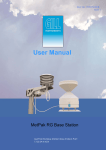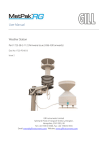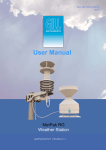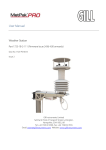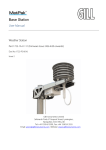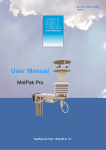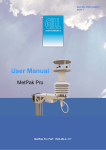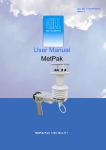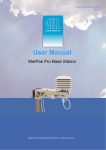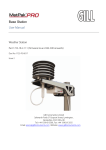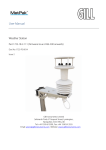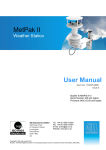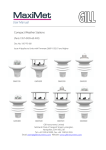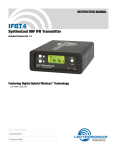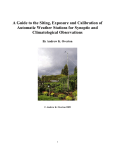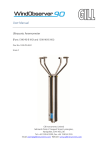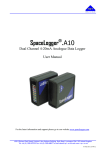Download MetPak RG Base Station User Manual - Issue 2
Transcript
Base Station User Manual Weather Station Part 1723-3A-2-111 (Firmware Issue 2436 4.00 onwards) Doc No: 1723-PS-0018 Issue 2 Gill Instruments Limited Saltmarsh Park, 67 Gosport Street, Lymington, Hampshire, SO41 9EG, UK Tel: +44 1590 613500, Fax: +44 1590 613555 Email: [email protected] Website: www.gillinstruments.com Foreword © 2011 Gill Instruments Ltd. All rights reserved. Thank you for purchasing the MetPak RG Base Station manufactured by Gill Instruments Ltd. To achieve optimum performance we recommend that you read the whole of this manual before proceeding with use. Gill products are in continuous development and therefore specifications may be subject to change and design improvements without prior notice. The information contained in this manual remains the property of Gill Instruments and should not be copied or reproduced for commercial gain. Guarantee For terms of guarantee, please contact your supplier. Warranty is void if the coloured Wind Sensor security seal is damaged or broken, or the Wind Sensor transducer caps have been damaged. Trademarks Microsoft and Windows are registered trademarks of Microsoft Corporation. All other brands and product names are trademarks or registered trademarks of their respective owners. Cautions and Notes The following symbols are used in this guide: CAUTION. This indicates an important operating instruction that should be followed to avoid any potential damage to hardware or property, loss of data, or personal injury. NOTE. This indicates important information to help you make the best use of this product. Applicable Parts MetPak RG Base Station 1723-3A-1-111 (Base Station only). MetPak RG Base Station 1723-3A-2-111 (with White WindSonic Option 2). MetPak RG Base Station 1723-3A-3-211 (with Heated WindSonic M). MetPak RG Base Station 1723-3A-4-311 (with Heated WindObserver). MetPak RG Base Station 1723-3A-5-111 (with WindMaster). MetPak RG Base Station 1723-3A-6-111 (with WindMaster Pro). Contents Contents 1. Introduction ......................................................................................................... 1 1.1 Principle of Operation...................................................................................................... 2 1.1.1 Wind Speed and Direction Sensor ..................................................................... 2 1.1.2 Radiation Shield ................................................................................................ 3 1.1.3 Temperature and Relative Humidity Sensor with Dewpoint Output .................... 3 1.1.4 Barometric Pressure.......................................................................................... 3 1.1.5 Rain Sensor (DIG1 Input) .................................................................................. 3 1.2 Abbreviations .................................................................................................................. 4 2. Installation .......................................................................................................... 5 2.1 Pre-Installation Checks ................................................................................................... 5 2.2 Installation....................................................................................................................... 6 2.2.1 Bench System Test ........................................................................................... 6 2.2.2 Bench Test Equipment Required ....................................................................... 6 2.2.3 Cabling .............................................................................................................. 7 2.2.4 Communication and Power Connections ......................................................... 14 2.2.5 Digital Rain Gauge Connections...................................................................... 18 2.2.6 MetPak RG Base Station System Connections ............................................... 19 2.2.7 Mounting MetPak RG Base Station ................................................................. 21 2.2.8 Mounting the Rain Gauge (e.g. ARG 100) ....................................................... 23 2.2.9 Mounting MetPak RG Base Station Heater Interface Box (Optional Item)........ 25 3. Operation ........................................................................................................... 26 3.1 Start Guide.................................................................................................................... 26 3.2 MetView ........................................................................................................................ 28 3.2.1 Opening MetView ............................................................................................ 28 3.2.2 Scanning for Devices....................................................................................... 29 3.2.3 The MetView Console ..................................................................................... 30 3.2.4 MetView Console Display Options ................................................................... 33 3.2.5 MetView Gauge Ranges and Graphs .............................................................. 34 3.2.6 Data logging .................................................................................................... 36 3.3 MetPak RG Base Station Configuration ........................................................................ 39 3.4 Configuring MetPak RG Base Station with MetSet ........................................................ 41 3.4.1 Opening MetSet .............................................................................................. 41 3.4.2 MetSet Editing Screen ..................................................................................... 43 3.4.3 Monitoring MetPak RG Base Station Output Data Using HyperTerminal. ........ 49 3.4.4 Configuring MetPak RG Base Station for SDI-12............................................. 51 3.4.5 SDI-12 Commands .......................................................................................... 51 Last Change 26 March, 2014 MetPak RG Base Station User Manual © Gill Instruments Ltd Page 1 Contents 3.4.6 3.4.7 4. Configuring MetPak for MODBUS .................................................................. 55 Safe Mode ....................................................................................................... 58 Troubleshooting ................................................................................................ 60 4.1 Fault-Finding ................................................................................................................. 60 4.2 Servicing ....................................................................................................................... 61 4.3 Bench Tests .................................................................................................................. 62 5. Maintenance ..................................................................................................... 63 5.1 Wind Sensor ................................................................................................................. 63 5.2 UV Shield (MetSpec Model Rad 16).............................................................................. 63 5.3 HygroClip for Temperature, Humidity and Dewpoint (Rotronic Model HC2-S3-GI) ........ 63 5.4 Barometer (on Hub PCB) .............................................................................................. 64 5.5 Rain Gauge (Based on using Gill Supplied ARG100 Rain Gauge part 1723-PK-076) ... 64 5.6 Spare Parts ................................................................................................................... 66 5.7 Returning the MetPak RG Base Station ........................................................................ 66 6. Technical Information ......................................................................................... i 6.1 Specification .................................................................................................................... i 6.2 MetPak RG Base Station Hub PCB Connections ............................................................ v 6.3 Electrical Conformity Certificate ..................................................................................... vii Figures Figure 1 Figure 2 Figure 3 Figure 4 Figure 5 Figure 6 Figure 7 Figure 8 Figure 9 Figure 10 Figure 11 Figure 12 Figure 13 Figure 14 Figure 15 Figure 16 Figure 17 MetPak RG Base Station Parts Compass points Internal view of the hub box Hub Box with Digital Pec fitted. Connection of Gill USB Cable (Part No. 1723-10-051) RS232 connections RS422 connections RS485 Connections SDI-12 connections MetPak RG Base Station DIG 1 Rain Gauge Connections Correct Mounting Position for MetPak RG Base Station Opening MetView Screen Scanning for MetPak RG Base Station Devices The MetView Console MetView Gauge Range MetView Graph Setting up data logging MetPak RG Base Station User Manual © Gill Instruments Ltd Page 2 1 2 14 15 15 16 16 17 17 18 22 28 29 30 34 35 36 Last Change 26 March, 2014 Contents Figure 18 Opening MetSet Screen 42 Tables Table 1 Table 2 Table 3 Table 4 Table 5 Table 6 Table 7 Table 8 Table 9 Table 10 Table 11 Table 12 Table 13 Table 14 Table 15 Table 16 Abbreviations Recommended Belden cable types Maximum cable lengths for supported communication and sensor network Connection status indicators MetView scale and unit options MetView averaging options Max/min markers MetView Screen Settings Options Default configuration settings MetPak RG Base Station Commands Common problems and their solution Status codes as output with the MetPak RG Base Station data string HygroClip connections (6-way connector J1) WindSonic anemometer connections (8-way connector J4) PC communications (8-way connector, J5) Digital Switch Input (2-way connector, J8) Last Change 26 March, 2014 4 12 13 30 33 33 33 33 39 50 60 61 v v vi vi MetPak RG Base Station User Manual © Gill Instruments Ltd Page 3 Contents Intentionally Blank MetPak RG Base Station User Manual © Gill Instruments Ltd Page 4 Last Change 26 March, 2014 Contents 1. Introduction MetPak RG Base Station is a compact and lightweight multi-sensor instrument that measures the most essential weather parameters. Gill ultrasonic technology, as used in the proven WindSonic instrument, measures wind speed and direction. Temperature and Humidity are measured and Dewpoint calculated using an industry standard probe housed in a naturally aspirated radiation shield. Barometric pressure is measured using an industry standard sensor. The Wind Sensor can be chosen from a 2 axis WindSonic Option 2 (white), WindSonic M Heated, WindObserver 70 enhanced heated or a 3 axis WindMaster or WindMaster Pro. The customer is able to add one digital contact closure rain gauge. The MetPak RG Base Station combines all the instrument data into a single combined data string. This may be configured for digital ASCII RS232/RS422/RS485 (2 wire point to point) and digital SDI-12 outputs. MODBUS RTU/ASCII outputs are also configurable. The instrument uses a rugged mounting clamp that attaches to any vertical pipe up to 58mm (2.3 inch) diameter. The Base Station electrical Hub box comes with a pre-installed 10 Metre cable to connect to a Gill Wind Sensor. There is one cable gland allocated to provide entry for termination of other sensors and one cable gland for data/power cables. A Heater Interface box (optional accessory) allows for termination of the Base Station 10 Metre cable to a heated Wind Sensor and Heater power supply. Radiation Shield Temperature and Relative Humidity Sensor Gortex Vent for Barometric Pressure Sensor Hub Box Mounting Bracket Figure 1 Last Change 26 March, 2014 MetPak RG Base Station Parts MetPak RG Base Station User Manual © Gill Instruments Ltd Page 1 Contents 1.1 1.1.1 Principle of Operation Wind Speed and Direction Sensor The MetPak RG Base Station can be used with Gill 2axis (WindSonic or WindObserver) or 3 axis (WindMaster or WindMaster Pro) wind speed and direction sensors. They are connected via the supplied RS422 10 Metre cable. The sensors measure the times taken for an ultrasonic pulse of sound to travel from the North transducer to the South transducer, and compares it with the time for a pulse to travel from S to N transducer. Likewise times are compared between West and East, and E and W transducer. If, for example, a North wind is blowing, then the time taken for the pulse to travel from N to S will be faster than from S to N, whereas the W to E, and E to W times will be the same. The wind speed and direction can then be calculated from the differences in the times of flight on each axis. This calculation is independent of factors such as temperature. 2 Axis Instrument 3 Axis Instrument Figure 2 Compass points and U,V (and W) for Wind Sensors MetPak RG Base Station User Manual © Gill Instruments Ltd Page 2 Last Change 26 March, 2014 Contents 1.1.2 Radiation Shield A MetSpec Multi-Plate Radiation Shield provides excellent protection to the Rotronics temperature and relative humidity sensor, shielding the probe from unwanted errors, especially from secondary upward reflecting solar radiation and/or wind blown precipitation/airborne contaminants. The special shield plate geometry, with its double louvre design, provides excellent response time performance of quick ambient temperature changes while still working effectively as a baffle to stop larger contaminants such as salt or dirt from reaching the Rotronics probe. Due to the increased protection offered to the Rotronics probe by the MetSpec shield, the maintenance cycle can be extended (see Para 5.2). The shield benefits from very robust material choice and extremely high UV protection requiring no maintenance. A further benefit of the MetSpec shield design is that the measured temperature is now even closer to reference temperature measurements made using artificially aspirated motors without the drawbacks of such systems (power and the maintenance of moving parts). 1.1.3 Temperature and Relative Humidity Sensor with Dewpoint Output The Rotronic HygroClip module is a complete instrument, with integrated temperature compensation. Calibration data is maintained within the integrated electronics. It provides digital output signals for Relative Humidity, Temperature and Dewpoint to the MetPak RG Base Station Hub box. Position of Temperature and Relative Humidity Probe in the Radiation Shield. 1.1.4 Barometric Pressure Barometric pressure output is provided by a solid-state device fitted on to the circuit board in the MetPak RG Base Station Hub box. Vent to atmosphere is via a Gortex filter which also protects the pressure sensor from the effects of wind and rain. 1.1.5 Rain Sensor (DIG1 Input) Rainfall is usually measured by the well-proven tipping bucket method. Rain is collected by a funnel and is passed to one of the two buckets situated at either end of a short balance arm. The balance arm tips when the first bucket is full, emptying this bucket and positioning the second bucket under the funnel. The tipping process repeats indefinitely as long as the rain continues to fall, with each tip corresponding to a fixed quantity of rainfall; at each tip the moving arm forces a magnet past a reed switch, causing contact to be made for a few milliseconds. A Rain Gauge can be connected to the MetPak RG Base Station Digital input, which detects when two dedicated terminals are short circuited (less than 1k ohm). Last Change 26 March, 2014 MetPak RG Base Station User Manual © Gill Instruments Ltd Page 3 Contents 1.2 Abbreviations Table 1 Item ASCII C CAL CD COM CR CSV ETX F FPM HF HPA HTML Hz IMM In Hg K KPH KTS LF M Bar Max MF Min Mm Hg MPH MS MS NSEW NVM PC ROM RS232 RS422 Rx RXD SDI-12 STX Tx TXD VHF WMO Abbreviations Meaning American Standard Code for Information Interchange Centigrade Calibration Compact Disc Communications Carriage Return Comma Separated Variable End of String Fahrenheit Feet per Minute High Frequency Hecto-Pascals Hyper Text Markup Language Hertz International Maritime Mobile Inches of Mercury Kelvin Kilometres per Hour Knots Line Feed Milli Bars Maximum Medium Frequency Minimum Millimetres of Mercury Miles per Hour Microsoft Metres per Second North South East West Non-Volatile Memory IBM compatible Personal Computer Read Only Memory Communications standard Communications standard Receive Received Data Serial – Data Interface standard for microprocessor based sensors Start of String Transmit Transmitted Data Very High Frequency World Meteorological Organisation MetPak RG Base Station User Manual © Gill Instruments Ltd Page 4 Last Change 26 March, 2014 Contents 2. Installation MetPak RG Base Station has been designed to meet and exceed the stringent standards listed in its specification (see Para 6.1). 2.1 Pre-Installation Checks MetPak RG Base Station Wind Sensor and Hub Box. As with any sophisticated electronics, good engineering practice should be followed to ensure correct operation: Ensure the MetPak RG Base Station Wind Sensor will not be affected by other equipment operating locally, which may not conform to current standards, e.g. radio/radar transmitters, generators etc. Avoid mounting in the plane of any radar scanner – a vertical separation of at least 2m should be achieved. When installing MetPak RG Base Station near radio transmitting antennas, ensure that the mounting position fulfills the following minimum separations (all round): VHF IMM – 1m MF/HF – 5m Satcom – 5m (avoid likely lines of sight) Use cables recommended by Gill (see Para 2.2.3). If cables are cut and re-connected incorrectly (perhaps in a junction box) then EMC performance may be compromised if cable screen integrity is not maintained. Avoid earth loops – wire the system in accordance with these installation guidelines. Ensure that the power supply operates to the MetPak RG Base Station specification (see Para 6.1) at all times. Avoid turbulence caused by surrounding structures that will affect the accuracy of the sensors such as trees, masts and buildings. The WMO make the following recommendations. The standard exposure of wind instruments over level open terrain is 10m above the ground. Open terrain is defined as an area where the distance between the sensor and any obstruction is at least 10 times the height of the obstruction. Keep away from building exhaust vents, machinery and motors. Rain Gauge The site chosen to install the rain gauge will depend in part on the application to which it is being put and in part on the particular circumstances at the site. But if possible site the rain gauge so that the distance between the rain gauge and an obstruction, such as Trees or buildings is at least as great as twice the height of the obstruction. If the application is very specific, such as monitoring a building site, then the siting of the rain gauge is largely prescribed by use. NOTE: No two rain gauge designs are ever likely to produce identical results, and identical rain gauge can give slightly different catches even when sited close to each other. Customers with 2 or more sets of equipment must not swap around rain gauges with MetPaks without using MetSet to change the calibration figure. Last Change 26 March, 2014 MetPak RG Base Station User Manual © Gill Instruments Ltd Page 5 Contents 2.2 2.2.1 Installation Bench System Test Prior to physically mounting the MetPak RG Base Station in its final location, we strongly recommend that a bench system test is carried out to confirm the system is configured correctly, is fully functional and electrically compatible with the selected host system and cabling (preferably utilising the final cable length). The required data format, units, output rate, and other options should also all be set up at this stage. Note that MetPak RG Base Station can be supplied by Gill Instruments with an optional matching Rain Gauge and its tip calibration factors will have been preprogrammed into the MetPak hub box. If a replacement Rain gauge is used then the Hub box will need re-programming using Gill MetSet Software with the new tip calibration factor (if this has changed). 2.2.2 Bench Test Equipment Required 1723-3A-1-111 MetPak RG Base Station set for RS232 communication (factory default setting) and matching Rain Gauge. 1723-10-051 MetPak RG Base Station RS232 to USB 1.8M configuration cable with integral 5v power (for WindSonic units only). Otherwise use RS232 I/F converter and separate 12v to 30 dc power supply. ES-U-1001-A EasySynch RS232 to USB adaptor or equivalent (if not using Gill part 1723-10-051) or connect directly to an RS232 COM port. Power Supply 12Vdc to 30Vdc at 100mA if required. Belden 9503 3 pair communications and power cable (if not using Gill Part 172310-051), length as required. Digital Multimeter capable of measuring resistance and dc volts. Gill MetSet and MetView Software supplied on the MetPak RG Base Station CD or download from. http://www.gill.co.uk/main/software.html Wind Sensor- should be configured as per the following list:1405-PK-072 WindSonic Option 2 White M4,U1,O1,L1,P1,B4,H2,NQ,F1,E2,T1,S4,C2,G0,K0, 1405-PK-200 WindSonic M Heated M4,U1,O1,L1,P1,B4,H2,NQ,F1,E2,T1,S4,C2,G0,K0, 1390-70-B-313 WindObserver 70 heated with short connector base. Note - Firmware Version V 6.02 onwards A0,B4,C1,E1,F1,G0000,H2,J1,K1,L1,M4,NQ,O1,P1,T1,U1,V1,X1,Y1,Z1. 1590-PK-020 WindMaster M4,U1,O1,L1,P1,B4,H2,NQ,E1,T1,S1,C2,A4,I1,J1,V1,X1,G0,K0,F1 1,F2 0,F3 1 1561-PK-020 WindMaster Pro M4,U1,O1,L1,P1,B4,H2,NQ,E1,T1,S1,C2,A4,I1,J1,V1,X1,G0,K0,F1 1,F2 0,F3 1 For Power Supply/Supplies and cables suitable for the chosen Wind sensor see relevant wind sensor manual supplied with the sensor or download from http://www.gill.co.uk/data/manuals/manuals.htm . MetPak RG Base Station User Manual © Gill Instruments Ltd Page 6 Last Change 26 March, 2014 Contents 2.2.3 Cabling Base Station RS422 10 Metre Cabling The MetPak RG Base Station comes with an integral 10 Metre, Belden 8104 cable fitted to the hub box connector J4, (RS422 interface). It is terminated in Clipper connector solder contacts for installing into a WindSonic Option 2 or WindMaster/WindMaster Pro Connector (connectors supplied with the Wind Sensor). If used with a WindObserver 70 or WindSonic M the contact pins will need to be cut off and wire stripped/soldered for termination into the Heater Interface Box. Details on fitting the connector pins on the 10 Metre cable into the WindSonic option 2 or WindMaster/WindMaster Pro connector are as follows:If shortening the 10 Metre cable to a required length, strip and prepare as follows:1. Trim back the screened cable outer PVC sheath to 52mm. 2. Trim back the braid and drain wire to 20mm from the outer sheath. 3. Separate braid and drain wire from the foil and cores. Twist braid and drain wires together. 4. Trim the twisted braid and drain wire to 15mm from the outer sheath and tin ends 5mm. 5. Cut the foil and White/Green wire back to within 5mm of the outer sheath. 6. Strip and tin one end of the White/Green wire removed to 5mm. 7. Locate White/Green wire to twisted braid and drain wire and solder. 8. Insulate the White/Green wire joint. 9. Strip back the connection wires by 4mm and tin solder. 10. Solder the contact pins supplied with the connector to the wires. 11. Note that the sensor connector supplies the correct strain relief for cables with an outside diameter of 6-12mm. Cable Sleeve Contact Pin Route the cable through the connector parts as in direction shown below (WindSonic connector shown, the WindMaster Connector is similar). Last Change 26 March, 2014 MetPak RG Base Station User Manual © Gill Instruments Ltd Page 7 Contents Whilst squeezing the red retainer in the direction of ARROWS A, pull in the direction of ARROW B. A A B Your connector should now resemble the connector in the picture below. Insert each contact pin until you feel a slight click. If you have inserted the contact into the incorrect hole it can be removed at this point by simply pulling it out. Please note there will be some resistance. WindSonic (Option 2) RS422 10 Metre Cable Connections Connections for the WindSonic connector are as follows:- Green/White wire to Connector Pin 1 Orange/White wire to Connector Pin 2 White/Orange wire to Connector Pin 3 Brown/White wire to Connector Pin 4 White/Brown wire to Connector Pin 5 Blue/White wire to Connector Pin 6 White/Blue wire to Connector Pin 7 White/Green cut off at sleeve 1 8 7 2 9 3 4 6 5 Rear View of Connector MetPak RG Base Station User Manual © Gill Instruments Ltd Page 8 Last Change 26 March, 2014 Contents Continue to insert all of the contacts you require. Once all of the contacts are inserted squeeze the 2 red retainers (See Arrows A on previous page) into place. NB. The retainer can only be pushed back into place if the contacts are fully engaged. Fit the connector to the WindSonic Sensor so that you can finish assembling the connector. Screw the back shell onto the connector until it is fully in place. Please note that the final rotations can be slightly stiff. Now screw the next part of the connector into place. Now screw the cable-clamping nut into place. The connector can now be removed from the WindSonic. NOTE: To disassemble the connector, reverse this procedure. Last Change 26 March, 2014 MetPak RG Base Station User Manual © Gill Instruments Ltd Page 9 Contents WindMaster and WindMaster Pro RS422 10 Metre Cable Connections The WindMaster uses the same range of connector as the WindSonic except for being a 31 way type. Follow the WindSonic connector assembly procedure except for:White/Brown wire to Connector Pin 1 Brown/White wire to Connector Pin 2 Green/White wire to Connector Pin 4 Blue/White wire to Connector Pin 5 White/Blue wire to Connector Pin 6 Orange/White wire to Connector Pin 11 White/Orange wire to Connector Pin 12 White/Green wire to Connector Pin 31 WindMaster 31 way Connector Pin outs MetPak RG Base Station User Manual © Gill Instruments Ltd Page 10 Last Change 26 March, 2014 Contents WindSonic M (Heated) RS422 10 Metre Cable Connections to the Optional Heater Interface Box. Note: See also the lid of the Heater Interface Box for Connection Details. Cut off the contact pins connected to the MetPak RG Base Station 10 Metre cable, strip and solder wires. Connect wires to the Heater Interface Box as follows:Remote Base Station 10 Metre Cable White/Green Green/White Orange/White White/Orange Brown/White White/Brown Blue/White White/Blue No Connection No Connection Heater Power Supply Heater Supply +ve Heater Supply -ve Heater Interface Box 8 Way Terminal Block 8 7 6 5 4 3 2 1 No Connection No Connection WindSonic M (Heated) 9 Way Connector 1 No Connection 2 3 4 5 6 7 8 9 Heater Power Interface Box 4 Way Terminal Block 3 2 WindSonic M (Heated) 9 Way Connector 8 9 WindObserver 70 (Enhanced Heated) RS422 10 Metre Cable Connections to the Heater Interface Box. Note: See also the lid of the Heater Interface Box for Connection Details. Cut off the contact pins connected to the MetPak RG Base Station 10 Metre cable, strip and solder wires. Connect wires to the Heater Interface Box as follows:- Last Change 26 March, 2014 Remote Base Station 10 Metre Cable White/Green Green/White Orange/White White/Orange Brown/White White/Brown Blue/White White/Blue No Connection No Connection Heater Interface Box 8 Way Terminal Block 8 or Screen Terminal Tag 7 6 5 4 3 2 1 No Connection No Connection WindObserver 70 (Enhanced Heated) 19 Way Connector Cable Screen/Drain wires M R D P C U V A, E and H B, F and G Heater Power Supply Heater Power Interface Box WindObserver 70 (Enhanced Heated) Heater Supply +ve Heater Supply -ve 4 Way Terminal Block 3 2 19 Way Connector A, E and H B, F and G MetPak RG Base Station User Manual © Gill Instruments Ltd Page 11 Contents Remote Base Communication Cabling MetPak RG Base Station has five communication connection options: USB (using the 1.8m Gill USB cable, Part No. 1723-10-051). RS232 RS422 RS485 (two wire point to point). SDI-12 MetPak RG Base Station has a Rain Gauge Digital Input connection: Digital Switch (DIG1) It is important that the cable is appropriate for the chosen connection option. The following sections describe the recommended types and maximum lengths of cable in each case. NOTE. A 15-metre, 6-pair cable (wires stripped at each end) suitable for RS232/RS422 or SDI-12 communication is available from Gill Instruments (Part No. 1723-10-053). Cable Type Data Comms Wire type: 24AWG Wire size: 7x32 AWG. Cable outer diameter: 6-8mm (to match the hub box gland). For RS422/485 operation the cable should contain twisted pairs screened to match the application. Cable Type Rain Gauge (for example) Wire type: 22AWG Wire size: 7x30 AWG. The cable should contain a twisted pair screened. NOTE: The optional Rain Gauge if supplied by Gill Instruments with the MetPak RG Base Station has a 6 Metre cable connected to it ready to wire into the MetPak RG Base Station hub box. The following table shows an example manufacturers’ reference; other manufacturers’ equivalents can be used. Table 2 Recommended Belden cable types Application No. of Pairs Rain Gauge Connection 1 Belden Ref. 8761 SDI-12 or RS485 2 9729 Digital RS232 3 9503 Digital RS422 4 9504 Cable length The maximum cable length is dependent on the chosen communication method. The following table shows the maximum cable lengths for the supported communication protocols at the given baud rates, using the recommended cable. If any problems of data corruption etc. are experienced, then a slower baud rate should be used. Alternatively, a higher specification cable can be tried. MetPak RG Base Station User Manual © Gill Instruments Ltd Page 12 Last Change 26 March, 2014 Contents Table 3 Maximum cable lengths for supported communication and sensor network Communication format Baud rate RS232 19200 Max. cable length 6.5M RS422/485 19200 1000M SDI-12 1200 90M Digital Switch Input Not Applicable Switch contact and cable resistance to be less than 1k ohm Cabling (unused wires) Any unused wires in the connecting cables should be connected to ground preferably at the user equipment end. Cabling protection The Cable should be secured: With cable clamps or equivalent at regular intervals such that the hub box cable gland does not support the cable weight. Away from the mounting bolts to prevent chaffing of the cable. NOTE. Install appropriate strain relief support to the cable. If possible, pass the cable through the mounting pole. Earthing To ensure correct operation and for maximum protection from lightning, a separate lightning rod system is recommended to protect the system. You can also earth the MetPak RG Base Station through its mountings or by connecting a grounding cable (minimum of 6mm² copper wire) to a spare MetPak RG Base Station metalwork bolt hole. Clean off any paint that might prevent a good connection. When you connect the communications cable ensure that the screen has a connection to the hub box case. The optional Heater Interface Box has a plastic case, hence ensure continuity of cable screens into and out of the boxes using the common earthing terminals provided in the boxes. Routing Cables through the Hub Box Glands NOTE: The MetPak RG Base Station Hub Box cable glands contain spring loaded metal leaves that are designed to make a ground contact with cables that have an overall braid screen. Care is therefore required when inserting and removing cables through the glands to prevent damage to the metal leaves. Last Change 26 March, 2014 MetPak RG Base Station User Manual © Gill Instruments Ltd Page 13 Contents 2.2.4 Communication and Power Connections To connect the MetPak RG Base Station Power and Communications cable: 1. Open MetPak RG Base Station’s hub box by unfastening the four screws. 2. Locate connector J5 (see Figure 3). Carefully pull the connector off its circuit board pins. 3. Strip the cable wires to 8mm. 4. Pass the cable through one of the gland nuts (please refer to the 2nd NOTE on Page 8). 5. Connect your cable as shown in the following diagrams: Gill USB Cable Figure 5 RS232 Figure 6 RS422 Figure 7 RS485 Figure 8 SDI-12 Figure 9 6. Attach the cable’s screen wires to the terminal post (see Figure 3). 7. After connection, securely tighten the gland nut to prevent moisture ingress. NOTE. Ensure that MetPak RG Base Station is configured for the chosen communications method J4 Pin 1 J1 Pin 6 Figure 3 J5 Pin 8 Hex Terminal Post J5, showing RS232 to USB Configuration Cable Wires Internal view of the hub box MetPak RG Base Station User Manual © Gill Instruments Ltd Page 14 J5 Pin 1 Last Change 26 March, 2014 Contents Figure 4 Hub Box with Digital Pec fitted. USB Lead Connection (COMMS set for RS232) Connect to Hub box J5 Connect MetPak RG Base Station to a PC USB port using the Gill Configuration Cable 1723-10051. J5 Pin 1 2 3 4 5 6 7 8 Colour None None Yellow Orange None None Black Red Figure 5 Connection of Gill USB Cable (Part No. 1723-10-051) NOTE:- If upon connecting the USB lead to a PC the driver is not found by the PC, then the appropriate driver to match the PC Windows version may be downloaded from:http://www.ftdichip.com/Drivers/VCP.htm Last Change 26 March, 2014 MetPak RG Base Station User Manual © Gill Instruments Ltd Page 15 Contents Digital Output RS232 Connections (COMMS set for RS232) This is the MetPak RG Base Station default communication configuration setting. J5 Hub Box 8 Way Push fit Block Terminal Signal names Nos. 3 Pair Cable PC 9 Way D Type Connector Pin Signal No’s Names RS232 TX RS232 RX 3 4 2 3 RXD TXD Signal Ground 2 5 Ground Chasis Ground Terminal Post NA Chassis Ground V supply – V supply + 7 8 Figure 6 Screen wires – + DC Power supply RS232 connections Digital Output RS422 Connections (COMMS set for RS422) This is not the default communications setting; ensure the MetPak RG Base Station has been configured for this output requirement before wiring to a user device. J5 Hub Box 8 Way Push fit Block Terminal Signal Names Nos. RS422 TX + RS422 TX – RS422 RX + RS422 RX – Signal 0v 6 3 5 4 2 Chassis Ground Terminal Post V Supply – V Supply + 7 8 Figure 7 RS422 to RS232 or USB Converter 4 Pair Cable RX + RX – TX + TX – Signal Ground Screen wires Chassis Ground – + DC Power Supply RS422 connections MetPak RG Base Station User Manual © Gill Instruments Ltd Page 16 Signal Names Last Change 26 March, 2014 Contents Digital Output RS485S 2 Wire Point to Point Connections (COMMS set for RS485P2W) This is not the default communications setting; ensure the MetPak RG Base Station has been configured for this output requirement before wiring to a user device. Note that it is not possible to network other devices on this 2-wire RS485 link unless the unit has been set for Modbus operation and application. J5 Hub Box 8 Way Push fit Block Terminal Signal Names Nos. RS485 to RS232 or USB Converter 2 Pair Cable Signal Names RS485 TX + RS485 RX+ RS485 TX – RS485 RX – 6 5 3 4 RS485TX/RX+ Signal 0v 2 Signal Ground Chassis Ground Terminal Post Power 0v Power +ve 7 8 Figure 8 RS485TX/RX– Screen wires Chassis ground – + DC Power Supply RS485 Connections Digital Output SDI-12 Connections (COMMS set for SDI12) This is not the default communications setting; ensure the MetPak RG Base Station has been configured for this output requirement before wiring to a user device. J5 Hub Box 8 Way Push fit Block Signal Terminal Names Nos. 2 Pair Cable Signal Names SDI-12 1 SDI-12 Signal Ground 2 Signal Ground Chassis Ground Terminal Post V Supply – V Supply + 7 8 Figure 9 Last Change 26 March, 2014 SDI-12 Device Screen wires Chassis Ground – + DC Power Supply SDI-12 connections MetPak RG Base Station User Manual © Gill Instruments Ltd Page 17 Contents 2.2.5 Digital Rain Gauge Connections Rain Gauge Cable Entry Gland. Rain Gauge Connections J8 Terminal 1 J8 Terminal 2 Rain Gauge Digital Switch Connection (DIG 1) J8 Hub Box 2 Way Terminal Block Terminal Signal Names Nos. DIG 1 GND Chassis Ground Figure 10 2 1 Terminal Post Digital Switch e.g. Rain Bucket Supplied 6M Cable Clear Black Screen Wire Signal Names Switch Contact Return Switch Contact Chassis Ground MetPak RG Base Station DIG 1 Rain Gauge Connections To connect the Rain Gauge 6 Metre lead to the Hub Box. 1. Open MetPak RG Base Station’s hub box by unfastening the four screws. 2. Locate connector J8 (see Figure 3). 3. Pass the cable through one of the gland nuts (see Note below). 4. Connect the cable as detailed in Figure 10. 5. Attach the cable’s screen wire to a terminal post. 6. After connection, securely tighten the gland nut to prevent moisture ingress. 7. NOTE: The MetPak RG Base Station Hub Box cable glands contain spring loaded metal leaves that are designed to make a ground contact with cables that have an overall braid screen. Care is therefore required when inserting and removing cables through the glands to prevent damage to the metal leaves. MetPak RG Base Station User Manual © Gill Instruments Ltd Page 18 Last Change 26 March, 2014 Contents 2.2.6 MetPak RG Base Station System Connections Example Non Heated Wind Sensor System Hub Box/Anemometer Supply and Communications Cable Last Change 26 March, 2014 MetPak RG Base Station User Manual © Gill Instruments Ltd Page 19 Contents Example Heated Wind Sensor System Anemometer Heater Supply Hub Box/Anemometer Supply and Communications Cable MetPak RG Base Station User Manual © Gill Instruments Ltd Page 20 Last Change 26 March, 2014 Contents 2.2.7 Mounting MetPak RG Base Station MetPak RG Base Station uses a mounting clamp suitable for attaching to a vertical pipe with a diameter of 30-58mm (1.2 to 2.3 inches). When mounting MetPak RG Base Station, consider the position, orientation and alignment of the unit. Note that the mounting pipe should first be degreased and when assembling the MetPak clamp assembly the outer clamp nuts need to be tightened evenly to a torque figure of 3 Nm. The moving plate part of the clamp needs to be reversed for poles below 38 mm diameter. Mounting Bracket Assembly Exploded View Earthing Point for supplied screw/washer/tag Mounting Bracket Assembled View Last Change 26 March, 2014 MetPak RG Base Station User Manual © Gill Instruments Ltd Page 21 Contents Position It is the responsibility of the customer to ensure that the MetPak RG Base Station is mounted in a position clear of any structure, including the mounting post, which may obstruct the airflow or induce turbulence. Orientation Normally, the MetPak RG Base Station is mounted on a vertical pole, ensuring a horizontal Measuring Plane (see Figure 11). For indoor use the unit may be mounted with the Measurement Plane set to any required orientation. Alignment The MetPak RG Base Station Wind Sensor should be aligned to point to North, or other required reference direction. There are two arrows, a coloured rectangle, and an alignment notch on the WindSonic Wind Sensor that should point to North to aid alignment (See Figure 11). Note. It is usually simpler to work first with a compass at ground level and identify a suitable landmark and its bearing. Figure 11 Correct Mounting Position for MetPak RG Base Station Interference Always check the installation to ensure the MetPak RG Base Station is not affected by other equipment operating locally, which may not conform to current standards, e.g. radio/radar transmitters, boat engines, generators etc. See Para 2.1 for guideline details. CAUTION. Do NOT mount the MetPak RG Base Station in close proximity to high-powered radar or radio transmitters. A site survey may be required if there is any doubt about the strength of external electrical noise. MetPak RG Base Station User Manual © Gill Instruments Ltd Page 22 Last Change 26 March, 2014 Contents 2.2.8 Mounting the Rain Gauge (e.g. ARG 100) The rain gauges tipping bucket mechanism is immobilised before shipping to prevent damage in transit. To release the mechanism, remove the funnel from its base by unscrewing the three nylon thumbscrews. Remove the piece of foam from under the bucket mechanism. This foam may be saved and used whenever the rain gauge is moved. The MetPak RG Base Station mounting arrangement options: - Baseplate Mounting (Example shown is ARG100) Due to the low weight of the rain gauge (1kg approximately) it must be mounted securely, the use of the Baseplate is recommended for this. However the gauge may be mounted via the three holes in the base to a paving slab for example. It is suggested that rawlbolts are used for this purpose as they provide a means of levelling the rain gauge. Nylon Spacers Tipping Bucket Spirit Level Upper Nylon Thumb Nut Corner Hole Unscrew the 3 upper nylon thumb nuts and remove all the nylon spacers from the studs. Lift off the tipping bucket base assembly to leave the metal baseplate and studs. Fix the baseplate to level ground using the 4 pegs provided through the 4 corner holes. The baseplate may be mounted to hard surfaces like concrete by replacing the 4 supplied pegs with screws and rawlplugs. For temporary mounting on hard surfaces use some bricks or heavy weights on the four corners of the baseplate (the height of the weights should be kept as low as possible to cause the minimum interference with the aerodynamics of the rain gauge). Refit the tipping bucket base assembly. Refit the nylon spacers over the 3 studs. Loosely screw on the 3 nylon thumb nuts. Last Change 26 March, 2014 MetPak RG Base Station User Manual © Gill Instruments Ltd Page 23 Contents Leveling the Base Assembly Upon completion of the above adjust the 3 leveling thumb nuts under the tipping bucket to align the spirit level bubble to within the centre circle. Now tighten the upper 3 thumb nuts ensuring that the spirit level bubble remains within the centre circle. NOTES: Ensure that the Foam insert under the tipping bucket is removed before re-fitting the funnel. No two rain gauge designs are ever likely to produce identical results, and identical rain gauge can give slightly different catches even when sited close to each other. Customers with 2 or more sets of equipment must not swap around rain gauges with MetPaks without using MetSet to change the calibration figure. MetPak RG Base Station User Manual © Gill Instruments Ltd Page 24 Last Change 26 March, 2014 Contents 2.2.9 Mounting MetPak RG Base Station Heater Interface Box (Optional Item) This Interface box is an optional item that can be included with orders for:MetPak RG Base Station 1723-2A-3-211 (with Heated WindSonic M). MetPak RG Base Station 1723-2A-4-311 (with Enhanced Heated WindObserver 70). Last Change 26 March, 2014 MetPak RG Base Station User Manual © Gill Instruments Ltd Page 25 Contents 3. Operation This section provides an overview of the operation of the MetPak RG Base Station. For more detailed information about any of the steps, use the references to other sections of this manual. 3.1 Start Guide Decide how you are going to connect MetPak RG Base Station to your PC or communications network. MetPak RG Base Station supports the following options: USB connection using Gill’s RS232 to USB 1.8M configuration cable (includes integral 5V power supply for WindSonic connections only) compatible with MetSet. To order, contact your dealer quoting part number: 1723-10-051). NOTE. You could use an equivalent RS232-USB adapter such as EasySynch RS232 to USB adaptor. RS232 connection using standard cable and PC COM port. Separate 12V to 30V dc power supply also required (compatible with MetSet). RS422 using RS232 converter (compatible with MetSet). RS485 2 wire point to point (not compatible with MetSet). SDI-12 connection (note SDI-12 is not compatible with MetSet Software). NOTE. MetPak RG Base Station is pre-configured for RS232 communication (factory setting). If you want to use an alternative communication protocol, you will need to set up the unit using an RS232 connection (with an appropriately wired cable), change the setting, shut the unit down, attach a cable for the new communication type, and then restart the unit. Unpack MetPak RG Base Station. Check that you have the following: MetPak RG Base Station unit (Part No.1723-3A-1-111). A suitable Gill Wind Sensor (see Page 6). Rain Gauge if required. Gill MetView and MetSet Software and Manual supplied on the CD. If any parts are missing, please contact your dealer. MetPak RG Base Station User Manual © Gill Instruments Ltd Page 26 Last Change 26 March, 2014 Contents Last Change 26 March, 2014 1. Connect the 10 Metre RS422 cable to the appropriate Wind Sensor connector and Wind Sensor (or Heater Interface Box and Wind Sensor). 2. Open the Base Station hub connection box by unfastening the four retaining screws. Locate the connector: J5 (see Page 9, Figure 3). Carefully pull the connector block from its pins. 3. Prepare the communications cable by stripping the wires to a length of 8mm. Feed the prepared cable through one of the two available ports on the side of the connection box (please refer to the 2nd NOTE on Page 8). 4. Connect the cable to J5 as required for your chosen communications method. 5. Carefully press J5 onto its circuit board pins. 6. If connecting the Rain Gauge cable to the Digital Input, strip cable wires, (if necessary) and connect to connector J8 in the hub box. 7. Tighten the gland on the connection ports to seal the cables in place. Replace the top on the connection box. 8. If you are carrying out a bench test, continue to step 14. When you have finished testing, return to Step 9. 9. Ensure that if using a mounting pole that it has been degreased in the area where the MetPak RG Base Station will be positioned. 10. Position the MetPak RG Base Station against the mounting post (see page 15), fit the mounting kit bracket and tighten sufficiently to hold the unit in place but allowing it to be rotated or moved up and down the pole. 11. Check the orientation and alignment of the unit (see page 14). 12. Check the height of the unit and ensure it is clear of any obstructions, including the mounting post, that could interfere with MetPak RG Base Station’s measurements (see page 22). 13. Tighten the mounting bracket nuts evenly to a toque figure of 3Nm to hold the unit firmly in place. 14. Connect the communications cable to your PC or network device. 15. Connect the Digital cable to the Rain Gauge as required. 16. Place the MetPak RG Base Station CD in your PC’s CD drive and install MetSet and MetView. MetPak RG Base Station User Manual © Gill Instruments Ltd Page 27 Contents 3.2 MetView Before you can use MetView, check that MetPak RG Base Station is correctly connected to a Serial COM port or USB COM port on your PC. NOTES: MetView is compatible with RS232 and RS422 connected units only. MetView will note read NMEA data strings. 3.2.1 Opening MetView Click on the MetView button on your PC’s desktop or choose: Start > Programs > MetView > MetView The MetView Control Centre window is displayed. Scan Button– If MetPak RG Base Station transmit and receive wires are connected to the PC then use the Scan button to connect to MetView. Connection is Receive Only Tick Box – Use if the MetPak RG Base Station connection to the PC has only transmit wires connected and a MetSet version of its current device settings is available to upload to MetView. Select ‘Connection is Receive only’ tick box and click on the Scan button. Upload a MetSet generated Device file from a PC location as directed. Figure 12 Opening MetView Screen MetPak RG Base Station User Manual © Gill Instruments Ltd Page 28 Last Change 26 March, 2014 Contents 3.2.2 Scanning for Devices To set up communicate between MetView and a connected MetPak RG Base Station. Click on the Scan button to search the available COM ports for MetPak RG Base Station devices. Figure 13 Scanning for MetPak RG Base Station Devices When a device is found, MetView obtains the MetPak RG Base Station configuration settings and then retrieves and displays MetPak RG Base Station data. Last Change 26 March, 2014 MetPak RG Base Station User Manual © Gill Instruments Ltd Page 29 Contents 3.2.3 The MetView Console When connected correctly, MetView displays its data-monitoring console. This consists of gauges showing: Wind Direction, Wind Speed, Pressure, Humidity, Temperature and Total Rainfall. There is also a digital readout of Dew Point. Buttons beneath each of the gauges allow you to choose the displayed units and other options. Each gauge (except Rainfall) also shows the maximum and minimum values recorded during the current session. The wind speed gauge also shows the maximum gust speed. Note: MetView will not show data if the unit is set for NMEA or SDI-12 format. Wind Direction Wind Speed Pressure Humidity Temperature Rainfall Averaging options Firmware Version and Unit ID Dew Point Load Settings button Save Default Settings Settings button button Logging button Disconnect button Max/Min Markers Figure 14 The MetView Console Connection Status Table 4 Reading Green Background Tick Red Background Cross 1.00Hz Wed 14 Nov 2012 12:12:22 Connection status indicators Function Indicates MetPak RG Base Station logging or communicating correctly with MetView along with reading the MetPak RG Base Station firmware version. Indicates MetPak RG Base Station not logging. Indicates the output rate of the MetPak RG Base Station when connected. Reads when the unit is communicating correctly with MetView. Real Time PC date and time indication. MetPak RG Base Station User Manual © Gill Instruments Ltd Page 30 Last Change 26 March, 2014 Contents MetPak RG Base Station Rainfall Gauge Display DIG 1 Input with user definable title On switch on MetView commences an incremental count of the total rainfall to date. The reset button will zero the MetView reading and recommence a new total count. Note. The order in which the instruments are shown in the MetView display reflects the order in which the instrument data appears in the MetPak RG Base Station data string. Last Change 26 March, 2014 MetPak RG Base Station User Manual © Gill Instruments Ltd Page 31 Contents MetPak RG Base Station 3 Axis Wind Display If the MetPak RG Base Station has been purchased configured for WindMaster or WindMaster Pro operation MetSet can be used to set the Wind Data output string to read in Polar and W or U, V and W output. When MetView reads the 3 axis Wind data it will either be displayed in Polar and W or U, V and W format as follows:Note MetView cannot switch between Polar and U, V and W displays. 3 Axis Polar and W Wind Display. 3 Axis U, V and W Wind Display. MetPak RG Base Station User Manual © Gill Instruments Ltd Page 32 Last Change 26 March, 2014 Contents 3.2.4 MetView Console Display Options MetView Console buttons can convert data from the MetPak RG Base Station to read different units or scale settings. This does not alter the actual MetPak RG Base Station configuration. Units shown in bold denote default settings Table 5 MetView scale and unit options Gauge Wind Direction Wind Speed Markers Wind Speed Pressure Humidity Temperature & Dew Point DIG1 Table 6 Setting Real Time 2 Min 10Min Table 7 Setting Off On Reset Table 8 Setting Save Settings Load Settings Default Settings Last Change 26 March, 2014 Function Use buttons to choose from two display styles: NSEW or Maritime Use buttons to add markers on the gauge for Max/Min or Max Gust. Use buttons to choose from five wind speed units: m/s, kph, mph, kts, fpm Use buttons to choose from pressure scales: hPa, mbar, inHg, mmHg Displays Max and Min values during current session in % Use buttons to choose from three temperature scales: °C, °F, K Typically for Rain, buttons available for inches or millimetres and a reset button. MetView averaging options Function Choose this button for no averaging Select for 2 minute rolling average of all sensor readings except DIG1 Select for 10 minute rolling average of all sensor readings except DIG1 Max/min markers Function Maximum and Minimum Markers on all gauges turned off Maximum and Minimum Markers on all gauges turned on Reset all Gauge Maximum/Minimum Markers and all digital Maximum/Minimum reading at will MetView Screen Settings Options Function Will Save all the current MetView screen settings to a file for later retrieval if required. Will load and update the MetView screen with a previously saved setting. Will return all MetView screen settings to factory default. MetPak RG Base Station User Manual © Gill Instruments Ltd Page 33 Contents 3.2.5 MetView Gauge Ranges and Graphs Gauge Range Settings. MetView Pressure, Humidity, Temperature and Rainfall Gauge ranges may be altered to view changes in conditions more visibly. Note, these changes only affect MetView settings and do not affect the MetPak RG Base Station output. For instance if the typical temperature measurement range required is from +10 degrees to +40 deg C then the temperature gauge range can be adjusted to reflect this. Place the mouse pointer over the Temperature display gauge and double click to bring up the Set Gauge Range screen. Change Max and Min readings to required values, e.g. +10 min and +40 max. Click on Set. The Temperature gauge range will be updated to reflect the change. Double Click to bring up Set Gauge Range. Figure 15 MetView Gauge Range MetPak RG Base Station User Manual © Gill Instruments Ltd Page 34 After changing the Range. Last Change 26 March, 2014 Contents Graphs MetView allows data detected over the last minute, last 1 hour and last 24 hours to be accessed and shown on a graph. Note. Data is only shown up to the time when the graph function is selected; the graph is not updated once opened. Data is collected from the time that MetView is opened and reading data from a MetPak RG Base Station. Double Click on the reading to bring up the graph. Click on the Last Min, Last Hour or Last 24 Hours buttons as required to view data. Figure 16 Last Change 26 March, 2014 MetView Graph MetPak RG Base Station User Manual © Gill Instruments Ltd Page 35 Contents 3.2.6 Data logging NOTE. MetView logs data based on the MetPak RG Base Station configuration not on the MetView console settings. To log MetPak RG Base Station data, click on the Logging button on the MetView console. The Logging dialog box is displayed. Figure 17 Setting up data logging Setting up a logging file Select Enable Logging to start logging to a file. Identify the name and location for the logging file: Log File location Click on the Browse button to identify the folder where you want to store the data file. Enter the name of the file. Log file header If required type some notes on the data that is to be recorded which will appear at the top of the saved data log file. Choose from the following additional options: Log File Rotation Set up segmented logging with each logged file length determined by the number entered in the text box below. The figure 3600, for example, means that each log file length will be 3600 lines of data. Maximum entries per log file are limited to 65535 and a maximum of 2048 log files can be created. Add Timestamp Adds the date and time to the logged data file taken from the PC clock. MetPak RG Base Station User Manual © Gill Instruments Ltd Page 36 Last Change 26 March, 2014 Contents To start logging Check that the Enable Logging option is selected. Click on the OK button to commence logging and return to the console. Note. To show that data is being recorded, the Logging button’s icon changes to a green tick: Logging active Logging stopped To stop logging Click on the Logging button on the MetView console. Clear the Enable Logging check box. Click on the OK button. If logging has stopped, the Logging button shows a red background cross instead of the green background tick (see above). Last Change 26 March, 2014 MetPak RG Base Station User Manual © Gill Instruments Ltd Page 37 Contents Understanding Logged Data Logged data is stored to a file with a .log extension. This can be viewed in any text/HTML editor or spreadsheet application. Figure 19 A typical data log (viewed in Windows Notepad) Each entry in the default reporting order consists of the following: 000001,Wed 14 November 2012 12:37:31, Q,262,000.04,1024.3,051.6,+023.5,+012.9,0000.000,+04.8,00, 62 Line Number PC Date/time stamp Start character Node letter Wind direction Wind speed Pressure Humidity Temperature Dewpoint Dig I/P (Rainfall) Supply Voltage Status Code End character Checksum MetPak RG Base Station User Manual © Gill Instruments Ltd Page 38 Last Change 26 March, 2014 Contents 3.3 MetPak RG Base Station Configuration MetPak RG Base Station can be configured using Gill MetSet software. The default configuration settings are listed in the following table. Table 9 Setting Function Comms Levels Baud Rate Data Connection Node ID Output rate Message Mode ASCII Set Up North Alignment Sensor WindSpeed Wind Speed Units Temperature Sensor Temperature Units Dewpoint Sensor Dewpoint Units Pressure Sensor Pressure Units Humidity Sensor Humidity Units Report Format RS232 19200 Data Bits 8, Parity None, Stop Bits 1, Flow Control None. Q 1Hz Continuous Carriage return and line feed, Echo on 0 On MS (Metres/Second) On C (Degrees Celsius) On C (Degrees Celsius) On Hecto Pascals On % Node, Polar (Wind Direction and Wind Speed), Pressure, Humidity, Temperature, Dewpoint, DIG1, Volts, Status, Checksum. On On On On On mm 10.000 Comma Separated Variable Status Message Output Report Message Output Units Message Output Inputs Message Output DIG1 Sensor Type DIG1 Units DIG1 Digital Count DIG1 Substitute Name Output Sentence Last Change 26 March, 2014 Default configuration settings MetPak RG Base Station User Manual © Gill Instruments Ltd Page 39 Contents Example MetPak RG Base Station Default Data String: <STX>Q,014,000.06,1011.2,042.1,+023.0,+009.4,0000.000,+04.9,00,<ETX>40 & (CR,LF) STX Node letter Wind direction Wind speed Pressure Humidity Temperature Dewpoint Digital Input 1 Supply voltage Status code ETX Checksum Carriage Return/Line Feed NOTES: <STX> is the Start of String character (ASCII value 2). <ETX> is the End of String character (ASCII value 3). Checksum, the 2 digit Hex Checksum sum figure is calculated from the Exclusive OR of the bytes between (and not including) the STX and ETX characters. Example MetPak RG Base Station Data String all Sensors Configured: With 2 Axis wind sensor Q,249,000.01,1017.3,049.2,+021.4,+010.3,0000.000,+11.6,00, 7C With 3 Axis wind Sensor MetSet is used to set 3 axis wind readings for Wind Direction and Speed (Polar) and W readings. Q,249,000.03,+000.02,1013.5,042.9,+022.0,+008.8,0000.000,+11.6,00, 50 MetSet is used to set 3 axis wind readings for U, V and W readings. Q,+000.01,-000.02,+000.00,1013.4,043.0,+022.1,+009.0,0000.000,+11.6,00, 74 NOTE. Switch on Time. Upon switching on the MetPak Pro, allow 9.5 seconds to elapse before data is output. MetPak RG Base Station User Manual © Gill Instruments Ltd Page 40 Last Change 26 March, 2014 Contents Configuring the Digital Switch Input (Rain Gauge Input) See Para 6.1 for Technical Specification. Configuring using MetSet. MetSet DIG1 Edit screen can be used to allow a MetPak RG Base Station count value to be input. The DIG1 Count value can be set from 0.001 to 10.000 in steps of 0.001 to represent one switch closure event taking place. In Continuous Output Mode A count will occur of the number of switch closure events taking place over 1 second (default 1Hz output rate or during 2 seconds (0.5Hz) or during 4 seconds (0.25Hz)) and will be output in each digital data output reading (when DIG 1 enabled). In Polled Mode The MetPak RG Base Station will store and output the cumulative total number of switch closures since the last poll request. Once the cumulative total has been output the count will be reset to zero. The maximum number of count events will be 9999, if the number counted exceeds 9999 an overflow character E will be output in the data string. 3.4 Configuring MetPak RG Base Station with MetSet Before you use MetSet check that MetPak RG Base Station is correctly connected to a Serial COM port or USB COM port on your PC. 3.4.1 Opening MetSet Click on the MetSet button on your PC’s desktop or choose: Start > All Programs > MetSet > MetSet The MetSet Control Centre window is displayed. If you have more than one MetPak RG Base Station connected to your PC, MetSet, by default, selects the first device detected. For most applications it is recommended to click on the MetSet Connect and Read button. Last Change 26 March, 2014 MetPak RG Base Station User Manual © Gill Instruments Ltd Page 41 Contents Connect the MetPak RG Base Station output to MetSet and read its configuration settings Connect the MetPak RG Base Station output to MetSet without reading its configuration settings Not Used Disconnect MetPak RG Base Station and create MetPak RG Base Station device settings using MetSet Offline MetSet supported products list Figure 18 Opening MetSet Screen MetSet interrogates the MetPak RG Base Station and returns a summary of the device settings. Note that MetSet also saves a copy of this screen to the connected PC as a Session Report File that can be accessed from the following destination. C:\Program Files(X86)\Gill Instruments\MetSet\SessionReports Close this screen to go to the Editing screens. MetPak RG Base Station User Manual © Gill Instruments Ltd Page 42 Last Change 26 March, 2014 Contents 3.4.2 MetSet Editing Screen When connected correctly a MetSet editing screen is available to read configuration settings, change configuration settings, save MetPak RG Base Station configuration settings to a PC file location, upload MetPak RG Base Station configuration settings from a PC file and view the MetPak RG Base Station raw data string output, MetSet Editing Pages Move mouse over exclamation or question marks to read setting comment MetPak RG Base Station Device Setting Options View MetPak RG Base Station Raw Data Output String Return to opening MetSet Screen Source of MetSet Data Serial Number Connection Status MetSet Connection Status Information. Reading S/N: 12520003 ONLINE 19200 COM 4 S/W ver:2436-4.00 Source: Device Last Change 26 March, 2014 Function MetPak RG Base Station Number ONLINE in green indicates the MetPak RG Base Station has been successfully connected to MetSet. OFFLINE in Grey indicates that MetSet is being used without a MetPak RG Base Station in communication with MetSet. 19200 reports on the MetPak RG Base Station Baud rate setting. COM 4 reports on the MetPak RG Base Station COM Port connection number. 2436 is the MetPak RG Base Station Firmware number 4.00 is the firmware revision. Protocol Version:4 . MetSet reads ‘Device’ when the source of the data that MetSet has retrieved has come from the MetPak RG Base Station. MetSet reads ‘File’ when the source of data has come from a saved file. MetSet reports on the connected MetPak device (METPAK RG BASE STATION) and reads the unit Serial Number (S/N: 12520003). MetPak RG Base Station User Manual © Gill Instruments Ltd Page 43 Contents MetSet Online Settings. Online Mode Buttons Get Device Settings Save Settings to Device Function MetSet retrieves the MetPak RG Base Station Configuration settings. MetSet configuration settings are saved to a connected MetPak RG Base Station. Load Configuration File When selected MetSet retrieves a MetSet edit PC file and updates MetSet with these settings. Save Configuration File When selected MetSet edit settings are saved to a PC file location. Back Up Device Settings When selected the MetPak RG Base Station configuration settings are transferred to MetSet and then to a file location selected on a PC. Restore Device Settings When selected MetSet retrieves a MetPak RG Base Station configuration setting from a PC file, loads it into the MetPak RG Base Station and updates the MetSet edit settings. Measurement Mode View Output Main Menu Click on View Output to view the raw ASCII MetPak RG Base Station data string scrolling at the output rate. (View only feature). E.g. Q,262,000.04,1024.3,051.6,+023.5,+012.9,0000.000,+04.8,00, 62 Click here to go back to the opening MetSet screen MetPak RG Base Station User Manual © Gill Instruments Ltd Page 44 Last Change 26 March, 2014 Contents MetSet Editing Page Functions. Click on any page to select set up parameters. The Comms Page can be used to Select:- Protocol:- GILL or MODBUS (for SDI-12 see COMMS Interface). Interface:- RS232, RS422, RS485 (point to point) and SDI-12. Baud Rate:- 4800, 9600, 19200, 38400 or 57600 (1200 auto selected with SDI-12 setting). Node ID:- A to P, Q to Z. Output Rate:- 0.25Hz to 1Hz. Message Mode:-Continuous or Polled. NOTE: When COMMS or Baud Rate settings are changed and Saved to Device a warning is issued by MetSet. These setting changes will not become active until the MetPak RG Base Station power is turned off and turned on again. The connecting device will then also need its Comms and Baud rate settings changed to match the MetPak RG Base Station. The ASCII Set Up Page can be used to select:- Last Change 26 March, 2014 Termination:- CRLF or CR Echo:- ON or OFF. MetPak RG Base Station User Manual © Gill Instruments Ltd Page 45 Contents The Wind Page can be used to select:- North Alignment from 0-359 degrees. Sensor WindSpeed ON or OFF. Wind Speed Units MS, KTS, MPH, KPH, FPM. (Metres/Second, Knots (Nautical miles/hour), Miles/Hour, Kilometres/Hour, Feet/Minute). The Temperature Page can be used to select:- Temperature Sensor ON or OFF Temperature Units C, K or F Dew Point Sensor ON or OFF Dew Point Units C, K or F (Centigrade, Kelvin, Fahrenheight) The Pressure Page can be used to select:- Pressure Sensor ON or OFF Pressure Units HPA, MB, MMHG, INHG (HectoPascals,Milli-Bars, Millimetres Mercury, Inches Mercury). The Humidity Page can be used to select:- Humidity Sensor ON or OFF Humidity Units % MetPak RG Base Station User Manual © Gill Instruments Ltd Page 46 Last Change 26 March, 2014 Contents The Reporting Page with a 2 Axis Wind Sensor can be used to select:- Report Format FULL or USERDEF Select Parameters to Report NODE,DIR,SPEED,PRESS,RH,TEMP,DEWPOINT,DIG1,VOLT,STATUS. Report parameters can be selected in any order or on or off in USERDEF. The Reporting Page with a 3 Axis Wind Sensor connected can be used to select:- Report Format FULL or USERDEF Select 3 axis Parameters to Report e.g. NODE,DIR,SPEED,W-AXIS,PRESS,RH,TEMP,DEWPOINT,DIG1,VOLT,STATUS. NODE,U-AXIS,V-AXIS,W-AXIS,PRESS,RH,TEMP,DEWPOINT,DIG1,VOLT,STATUS. The Power Up Page can be used to select:- Status Message Output ON or OFF. (E.g. METPAK RG BASE STATION OPTION R 2436 V4.00, STARTUP: OK) Report Message Output ON or OFF. (e.g. NODE,DIR,SPEED,PRESS,RH,TEMP,DEWPOINT,DIG1,VOLT,STATUS,CHECK) Units Message Output ON or OFF (e.g. -,DEG,MS,HPA,%,C,C,MM,V,-,- DIG1 = CONFIGURED) Last Change 26 March, 2014 MetPak RG Base Station User Manual © Gill Instruments Ltd Page 47 Contents The DIG1 Page can be used to select:- DIG1 Sensor ON or OFF Sensor Type Should be left selected to RAIN Units MM or IN Count can be set from 0.001 to 10.000 in 0.001 unit steps. Should be set to match the Rain Gauge calibration figure for example 0.199 (mm/hr). This figure can be found marked on the Rain Gauge internal label. Substitute Name A field available for typing in a user name between 3 to 8 characters long. In Continuous Output Mode A count will occur of the number of switch closure events taking place over 1 second (default 1Hz output rate or during 2 seconds (0.5Hz) or during 4 seconds (0.25Hz)) and will be output in each digital data output reading (when DIG 1 enabled). In Polled Mode The MetPak Pro Base Station will store and output the cumulative total number of switch closures since the last poll request. Once the cumulative total has been output the count will be reset to zero. The maximum number of count events will be 9999, if the number counted exceeds 9999 an overflow character E will be output in the data string. NOTE: Once all settings have been chosen then save Edited Page Settings to MetPak RG Base Station by clicking on ‘Save Settings to Device’ this will change the MetPak RG Base Station configuration to reflect the new MetSet settings. The MODBUS Page can be used to select:- Mode RTU or ASCII. Address 1 to 247, default is 1. Data Bits 7 for Modbus ASCII and 8 for Modbus RTU. Stop Bits 1 for Even/Odd Parity or 2 for No Parity. Parity NONE, ODD, or EVEN. Termination Char ASCII code 0-255, default is 10. Inter Char Timeout (ms) 500 to 10000, default is 1000. MetPak RG Base Station User Manual © Gill Instruments Ltd Page 48 Last Change 26 March, 2014 Contents 3.4.3 Monitoring MetPak RG Base Station Output Data Using HyperTerminal. NOTE. This section describes the procedure using Windows HyperTerminal. Alternatively Gill Wind Software (http://www.gill.co.uk/main/software.html) can be used a Terminal Emulator (note Tools feature not applicable). Select the required COM port and click on OK, the required 19200 Baud Rate is already selected (or use the Baudrate drop down) then continue as from step 7. Establishing a HyperTerminal Connection To monitor MetPak RG Base Station data using HyperTerminal: 1. Select an available Com port and connect the MetPak RG Base Station unit. 2. Run Hypertrm.exe (Typically accessed via:Start | All Programs | Accessories | Communications | Hyperterminal). 3. Select New Connection from the File menu. 4. Enter a name for the connection, for example MetPak RG Base Station and, optionally, select an icon to represent it. Click on the OK button. 5. In the Connect To dialog box, change Connect Using to COMX (where X is the number of the selected COM port). Click on the OK button. 6. In the COMX Properties dialog box, adjust the Port settings to match the MetPak RG Base Station unit’s settings. The default settings are : 7. Bits per second Data bits Parity Stop bits Flow Control 19200 8 None 1 None Click on the OK button. Message Reporting MetPak RG Base Station has two reporting modes: Continuous mode In continuous mode (the default) MetPak RG Base Station reports continuously. So, if you have set up the connection correctly, you should now see data strings scrolling across the HyperTerminal window. For example: Q,262,000.04,1024.3,051.6,+023.5,+012.9,0000.000,+04.8,00, 62 Polled mode If the unit has been set to polled mode type ?Q (where Q is the unit node letter) to prompt one line of the data string. Note, allow 9.5 seconds after switching on the unit before sending a poll command. When polled, allow 570 milli-seconds for the unit to respond with a line of data. If the MetPak RG Base Station detects a pressure/temperature/humidity sensor fault then allow 4 seconds for an error data output. Enter SETUP MODE to check Ser. Number and Firmware Version To enter the unit’s setup mode: Last Change 26 March, 2014 If the unit is in continuous reporting mode, type *. If the unit is in polled mode, type *Q (where Q is the unit node letter). MetPak RG Base Station User Manual © Gill Instruments Ltd Page 49 Contents The MetPak RG Base Station unit stops reporting sensor measurements and reporting (if in continuous mode) and responds with the following message: SETUP MODE The unit is now ready to receive commands. Returning to measurement mode To exit from the setup mode and return to the reporting mode: Type Q and press Enter. The MetPak RG Base Station unit returns to measurement mode and begins reporting (if set up for continuous mode). MetPak RG Base Station commands The following table lists the full set of commands for checking MetPak RG Base Station. Command Parameters Description and examples * * *A-Z *A | *Z ?A-?Z ?A to ?Z Used to place the unit into a SETUP mode so that User Commands may be sent to review unit settings. If the unit is in polled mode this command is used to place the unit into SETUP MODE so that User Commands may be sent to change unit settings. Where Q is the default node letter but may be set between A to Z. It is however recommended not to use letters A to F as these characters can appear in the checksum in the data string. ?A – ?Z Retrieves a line of data from a MetPak RG Base Station set for Polled mode with a Node identifier set to A to Z. EXIT Used to change the unit from Configuration mode to Measurement mode (alternatively type Q or QUIT) Used to change the unit from Configuration mode to Measurement mode (see also EXIT) Used to report the MetPak RG Base Station serial number. e.g. 11270001 Returns MetPak RG Base Station Firmware version e.g. SWVER = 2436 V2.01 Q or QUIT SERIAL SWVER Table 10 MetPak RG Base Station Commands Polling for Data The MetPak unit must be set for Message Mode Poll using MetSet software (Comms Page). A line of data will be output upon receipt of a ? followed by the Node ID (default Q). It is recommended not to use letters A to F as these characters can appear in the checksum in the data string. Notes:In Polled mode the unit MUST be allowed 9.5 seconds after switch on to be operational before the ? and Node letter are used to enable polling or it will be missed. When in polled mode, when data is requested allow 570 milli-seconds for the unit to respond with a line of data. If the MetPak RG Base Station detects a pressure/temperature/humidity sensor fault then allow 4 seconds for an error data output. Polled mode can only be used for point to point communications; it is not possible to network units on to a common bus (except in SDI-12 mode). MetPak RG Base Station User Manual © Gill Instruments Ltd Page 50 Last Change 26 March, 2014 Contents 3.4.4 Configuring MetPak RG Base Station for SDI-12 To configure a MetPak RG Base Station unit for SDI-12: 3.4.5 1. Connect a MetPak RG Base Station to a PC as described in Para 2.2.4. 2. Open MetSet as described on Page 33. 3. Click on the Edit Comms page and select SDI-12 from the drop down menu. 4. Click on Save Settings to Device on the Online Mode Menu. 5. Power down the MetPak RG Base Station unit. 6. Change the hardware connections for SDI-12. 7. Power up the MetPak RG Base Station unit. SDI-12 Commands SDI-12 Command Summary Last Change 26 March, 2014 ?! Unit Address (default is 0). aAb! Change unit address (a = 0). aM! Wind Direction/Speed (direction in Degrees, speed in Metres/Sec ), Temperature (degrees C), Pressure (Hecto Pascals/millibars) and Humidity (%). aM1! Wind Direction/Speed (direction in Degrees, speed in Metres/Sec ), Temperature (degrees C), Pressure (Hecto Pascals/millibars) and Dewpoint (degrees C). aM2! Wind Direction/Speed (direction in Degrees, speed in Metres/Sec ) and a 2 digit Wind only Status Codes. aM3! Temperature (degrees C), Pressure (Hecto Pascals/millibars), Dewpoint (Degrees C) and full MetPak RG Base Station Status Codes . aM4! Pressure (Hecto Pascals/millibars). aM5! Not applicable. aM6! Not applicable. am7! Not applicable. aM8! Digital Input 1 (Rain Gauge Input). aM9! Power Supply Voltage (Volts). aD0! Request a line of the above data. MetPak RG Base Station User Manual © Gill Instruments Ltd Page 51 Contents SDI-12 Commands with CRC aMC! Wind Direction/Speed (direction in Degrees, speed in Metres/Sec ), Temperature (degrees C), Pressure (Hecto Pascals/millibars), Humidity (%) and CRC. aMC1! Wind Direction/Speed (direction in Degrees, speed in Metres/Sec ), Temperature (degrees C), Pressure (Hecto Pascals/millibars), Dewpoint (degrees C) and CRC. aMC2! Wind Direction/Speed (direction in Degrees, speed in Metres/Sec ), a 2 digit Status Code and CRC. aMC3! Temperature (degrees C), Pressure (Hecto Pascals/millibars), Dewpoint (Degrees C) and CRC. aMC4! Pressure (Hecto Pascals/millibars) and CRC. aMC5! To aMC7! aMC8! Digital Input 1 (Rain Gauge) and CRC. aMC9! Power Supply Voltage (Volts) and CRC. aD0! Request a line of the above data. Not applicable. SDI-12 Command Details Command Description Response Example ?! Unit Address a<CR><LF> 0<CR><LF> aAb! Change the unit address b<CR><LF> 1<CR><LF> Wind Direction/Speed (direction in Degrees, speed in Metres/Sec ), Temperature (degreesC), Pressure (Hecto Pascals/millibars) and Humidity. atttn<CR><LF> 00055<CR><LF> a is unit identifier. 0 is unit identifier. ttt is time in seconds. 005 is 5 sec. measurement. n is number of data values. 5 is the number of data readings (Direction, Speed, Temperature, Pressure and Humidity). 0D0! Retrieve a line of the above data. a<dir><mag><temp><pressure> <humidity><CR><LF> 0+220+000.01+021.6+ 1013.0+041.9<CR><LF> aM1! Wind Direction/Speed (direction in Degrees, speed in Metres/Sec ), Temperature (degrees C), Pressure (Hecto Pascals/millibars) and Dewpoint (degrees C). atttn<CR><LF> 00055<CR><LF> 0D0! Retrieve a line of the above data. a<dir><mag><temp><pressure> <dewpoint><CR><LF 0+357+000.03+021.6+ 1013.0+008.0<CR><LF> a = 0, the default. b = the new address. aM! Measurement command to retrieve a reading of the maximum time the MetPak RG Base Station will take to complete a measurement, have data ready and the number of data values. MetPak RG Base Station User Manual © Gill Instruments Ltd Page 52 Last Change 26 March, 2014 Contents aM2! Wind Direction/Speed (direction in Degrees, speed in Metres/Sec ) and a 2 digit Wind only Status Code. atttn<CR><LF> 00053<CR><LF> 0D0! Retrieve a line of the above data. a<dir><mag><status><CR><LF > 0+029+000.01+00<CR><LF> aM3! Temperature (degrees C), Humidity (%), Dewpoint (Degrees C) and Full Sensor Status Codes. atttn<CR><LF> 00054<CR><LF> 0D0! Retrieve a line of the above data. a<temp><humidity><dewpoint> < CR><LF 0+021.6+041.0+007.8+00 <CR><LF> aM4! Pressure (Hecto Pascals/millibars). atttn<CR><LF> 00051<CR><LF> 0D0! Retrieve a line of the above data. a<pressure><CR><LF> 0+1013.0<CR><LF> AM8! Digital Input 1. atttn<CR><LF> 00051<CR><LF> 0D0! Retrieve a line of the above data. a<dig1><CR><LF> 0+0408.000<CR><LF> aM9! Power Voltage (Volts) atttn<CR><LF> 00011<CR><LF> 0D0! Retrieve a line of the above data. a<voltage><CR><LF> 0+12.5<CR><LF> CRC Commands Command aMC! Description Response Wind Direction/Speed (direction in Degrees, speed in Metres/Sec ), Temperature (degreesC), Pressure (Hecto Pascals/millibars) Humidity (%) and CRC. Example atttn<CR><LF> 00056<CR><LF> a is unit identifier. 0 is unit identifier. ttt is time in seconds. 005 is 5 sec. measurement. n is number of data values. 6 is the number of data readings (Direction, Speed, Temperature, Pressure, Humidity and CRC). Measurement command to retrieve a reading of the maximum time the MetPak RG Base Station will take to complete a measurement, have data ready and the number of data values. 0D0! Retrieve a line of the above data. a<dir><mag><temp><pressure> <humidity><CRC><CR><LF> 0+139+000.06+022.2+1017.8 +042.7+00BIQ<CR><LF> aMC1! Wind Direction/Speed (direction in Degrees, speed in Metres/Sec ), Temperature (degrees C), Pressure (Hecto Pascals/millibars), Dewpoint (degrees C) and CRC. atttn<CR><LF> 00056<CR><LF> 0D0! Retrieve a line of the above data. a<dir><mag><temp><pressure> <dewpoint><CRC><CR><LF 0+140+000.06+022.2+1017.7 +009.0+00D{Z<CR><LF> Last Change 26 March, 2014 MetPak RG Base Station User Manual © Gill Instruments Ltd Page 53 Contents aMC2! Wind Direction/Speed (direction in Degrees, speed in Metres/Sec ), a 2 digit Status Code and CRC. atttn<CR><LF> 00053<CR><LF> 0D0! Retrieve a line of the above data. a<dir><mag><status><CRC ><CR><LF> 0+098+000.04+00@sh<CR><LF> aMC3! Temperature (degrees C), Humidity (%), Dewpoint (Degrees C) and CRC. atttn<CR><LF> 00053<CR><LF> 0D0! Retrieve a line of the above data. a<temp><humidity><dewpoint> <CRC><CR><LF 0+022.2+042.7+009.0LV{<CR><L F> aMC4! Pressure (Hecto Pascals/millibars) and CRC. atttn<CR><LF> 00051<CR><LF> 0D0! Retrieve a line of the above data. a<pressure><CRC><CR> <LF> 0+1017.8GM <CR><LF> aMC8! Digital Input 1 and CRC. atttn<CR><LF> 00051<CR><LF> 0D0! Retrieve a line of the above data. a<dig1><CRC><CR><LF> 0+0000.000EgO<CR><LF> aMC9! Power Voltage (Volts) and CRC atttn<CR><LF> 00011<CR><LF> 0D0! Retrieve a line of the above data. a<voltage><CRC><CR> <LF> 0+12.2K@R<CR><LF> MetPak RG Base Station User Manual © Gill Instruments Ltd Page 54 Last Change 26 March, 2014 Contents 3.4.6 Configuring MetPak for MODBUS MetPak Supported Modbus Specification MODBUS RTU or ASCII. Baud Rate 9600 or 19200 Baud. COMMS RS232 point to point only, RS485 2 wire networkable. Modbus Parameters ASCII or RTU. Parameter Character Error Check Frame Start Frame End Gaps in Message Start Bit Data Bits Parity Stop Bits Modbus ASCII ASCII 0 to 9 and A to F (Hex) Longitudinal Redundancy Check (LRC) Character ':' (3A Hex) Characters CR/LF (0D/0A Hex) 1 Second 1 7 Even/Odd None 1 2 Modbus RTU Binary 0 to 255 Cyclic Redundancy Check (CRC) 3.5 Characters Silence 3.5 Characters Silence 1.5 Times Character Length 1 8 Even/Odd None 1 2 Requires:MetPak RG with version 2346-4.00 firmware and onwards. MetSet Software version 2.02-02 and onwards. Connect a MetPak RG to a PC COM port (default communication is RS232). Open Gill MetSet Software. Click on Connect and Read to reach the Editing Pages as shown below. Configuration Click on the MODBUS Page Last Change 26 March, 2014 Mode: Choose between RTU and ASCII, in this case RTU. Address: Choose a MetPak Address number to be between 1 to 247. Data Bits: Choose 7 for Modbus ASCII and 8 for Modbus RTU. Stop Bits: Choose 1 for Even/Odd Parity or 2 for No Parity (None). Parity: Choose Even/Odd or None. Termination Char ASCII code: Choose between 0-255. Inter Char Timeout (ms): Choose between 500ms to 10000ms. MetPak RG Base Station User Manual © Gill Instruments Ltd Page 55 Contents Select the COMMS Page Protocol: Default is Gill. Select MODBUS Interface: Default is RS232. Select RS232 or RS4852W. RS232 will only allow a single point to point non multi drop network connection. RS485 2 wire will allow networking with up to 32 connected devices. Baud Rate: supported). Default is 19200. Select required Baud rate (9600 or 19200 Node ID: Default is Q. Not used for MODBUS. Output Rate: to 1Hz). Default is 1Hz. Set update rate for MetPak Data (0.25Hz Message Mode: Default is CONT. Select POLL mode and MetPak will only make and output a measurement (set by the output rate) on demand from the Modbus Master. In CONTinuous mode the MetPak continuously makes measurements set by output rate (0.25Hz to 1Hz) and only outputs a result when demanded from the Modbus Master. When required settings have been selected click on Save Settings to Device Click on Yes and OK. Power down the MetPak and apply power back to the MetPak to complete setting changes. Note: now that the unit is in MODBUS mode if any further changes need to be made use the SAFE MODE connection and method to re-establish communication with MetSet. MetPak RG Base Station User Manual © Gill Instruments Ltd Page 56 Last Change 26 March, 2014 Contents METPAK MODBUS NOTES 1. 2. 3. 4. 5. 6. All registers are 16bit. The first byte is high order and the second is low. Each measurement is comprised of two 16bit registers. The registers are arranged High Word/ Low Word. Registers start at address 40001. Holding registers available in the order of the MetPak data string (which can be established by the REPORT command in non-Modbus Gill ASCII Mode). MetPak RG MODBUS Default Data String Field Encoding: Node Direction: Speed: Pressure: Temperature: Relative Humidity: Dewpoint: DIG1: Supply Voltage: Status: 4-byte character string 32 Bit Floating point value 32 Bit Floating point value 32 Bit Floating point value 32 Bit Floating point value 32 Bit Floating point value 32 Bit Floating point value 32 Bit Floating point value 32 Bit Floating point value 32 bit Unsigned Integer (UINT) Registers 40001-2. Registers 40003-4. Registers 40005-6. Registers 40007-8. Registers 40009-10. Registers 400011-12. Registers 400013-14. Registers 400015-16. Registers 400017-18. Registers 400019-20. See Simply Modbus program reading example MetPak RG MODBUS Data as follows:- Last Change 26 March, 2014 MetPak RG Base Station User Manual © Gill Instruments Ltd Page 57 Contents 3.4.7 Safe Mode Summary The MetPak RG Base Station Safe Mode provides a means of recovering communication with the MetPak RG Base Station whatever configuration setting may have been made. For instance if the unit has been set for SDI-12 operation Safe Mode can be used to change the communication option back to RS232 or RS422. Connection Connect the MetPak RG Base Station for RS232 communication as detailed on Page 11, Fig. 6. Method Note at this stage the MetPak RG Base Station supply to be switched off. Open a Terminal program e.g. Gill WIND Software (http://www.gill.co.uk/main/software.html ) or Windows HyperTerminal Note if using Gill Wind Software that the Tools features are not applicable. Open Gill Wind Software. Serial Port: Set the drop down menu to the required COM Port Connection. Click on the OK button. Baudrate: Set the drop down menu to 4800 Bauds. A blank Wind Terminal screen will be opened. Hold down the * key on the keypad. With the * key still held down, apply power to the MetPak RG Base Station. This will result in placing the unit into SAFE MODE. Press Enter to start a new line (Ignore illegal command line). To now change communication from SDI-12 to RS232. Type COMMS RS232 and press Enter. MetPak RG Base Station User Manual © Gill Instruments Ltd Page 58 Last Change 26 March, 2014 Contents Type Q and press Enter to exit SAFE MODE. Data will now scroll on screen. Note however for RS232 changes to take place the unit must be powered down and back up again. Close the 4800 baud rate Wind or HyperTerminal Program. Power down the MetPak RG Base Station and re-apply power. Open a new Wind or HyperTerminal program at 19200 baud rate. RS232 data will now scroll on screen at the MetPak RG Base Station default 19200-baud rate. The * command can now be used if required to place the unit into SETUP mode and make any other changes to the MetPak RG Base Station configuration. Last Change 26 March, 2014 MetPak RG Base Station User Manual © Gill Instruments Ltd Page 59 Contents 4. Troubleshooting 4.1 Fault-Finding Table 11 Common problems and their solution Symptom No output Corrupted output One way communication Unexpected Temperature /Dewpoint readings Unexpected Wind readings Unexpected Temperature/Dewpoint and Humidity readings Unexpected Barometer Readings Status code not 00 Unexpected Rainfall readings or no readings when raining. Solution Check DC power to MetPak RG Base Station, cable and connections. Check communications settings of the MetPak RG Base Station and host system match, including correct Com port. Check that the unit is in Continuous mode. Check that in-line communication devices are wired correctly. NOTE: It is usual for Anemometer TX + to be connected to converter device RX +. If appropriate use Safe Mode to attempt to obtain communication with the MetPak RG Base Station. Check that the communication settings of the MetPak RG Base Station and host system match. Try a slower baud rate. Check cable lengths and type of cable. Check that the wiring is in accordance with the manual. Check that the Temperature and Dewpoint units of measure (C, F, K) settings are correct on power up. Check that the Wind Sensor units of measure (m/s, knots, kph, ft/min, mph) settings are correct on power up. Check that the HygroClip filter is clean. Check that the Hub Box Gortex filter is not blocked. See Table 12 Check that the funnel and filter are not clogged and are clean. Check that the tipping bucket mechanism swings freely. MetPak RG Base Station User Manual © Gill Instruments Ltd Page 60 Last Change 26 March, 2014 Contents Table 12 string Status codes as output with the MetPak RG Base Station data Code Status 00 OK 01 02 Wind Sensor Axis 1 failed Wind Sensor Axis 2 failed 03 Wind Sensor Axis 3 failed 04 Wind Sensor Axis 1 and 2 failed Wind Sensor Axis 1 and 3 failed 05 06 07 Wind Sensor Axis 2 and 3 failed Wind Sensor Axis 1,2 and 3 failed 08 Wind Sensor NVM error 09 Wind Sensor ROM error 0B 10 20 40 66 Wind Sensor reading failed. Hygroclip error Dewpoint error Humidity error Wind Sensor Power Wind Sensor RS422 Communications 67 80 Pressure Sensor Warning FF No Wind Data XX More than one fault 4.2 Condition No fault conditions detected in measurement period. U Axis blocked or faulty. V Axis blocked or faulty. W Axis blocked or Faulty (WindMaster/Pro only). U and V axis blocked or faulty. U and W axis blocked or faulty (WindMaster/Pro only). V and W axis blocked or faulty (WindMaster/Pro only). U, V and W axis blocked or faulty (WindMaster/Pro only). Non Volatile Memory checksum failed, data could be uncalibrated. Read Only Memory checksum failed, data could be uncalibrated. Wind Sensor faulty. Hygroclip faulty. Hub Pec faulty. Hygroclip faulty. Check Wind Sensor is powered Check RS422 communication wiring Pressure sensor reading not available/unit faulty. Remote sensor wiring or communication format (not RS422) fault. Fault condition that can be the sum of 0B,10, 20 or 40. e.g. 1B would mean that both the Wind Sensor (0B) and Hygroclip (10) were faulty. Servicing In the event of failure, prior to returning to an authorised Gill distributor it is recommended that: All cables and connectors are checked for continuity, bad contact, corrosion etc. A bench test is carried out as described in the next section. Contact your supplier if a fault persists. Last Change 26 March, 2014 MetPak RG Base Station User Manual © Gill Instruments Ltd Page 61 Contents 4.3 Bench Tests Carry out MetPak RG Base Station bench test as follows: 1. Connect the MetPak RG Base Station unit to the host PC and power supply, using a known working test cable. 2. Check that the unit is correctly configured by going into Set Up mode (see page 49). 3. Check for normal output data, and that the Status Code is OK – 00. 4. If the status code is other than 00, refer to Table 12 for a list of status (error) codes. 5. Use an office fan or similar to check that the unit is sensing wind, turning the unit to simulate changing wind direction and to check that both axes are functioning. 6. Check for output changes in temperature and relative humidity sensor (the fan will also cause small changes in these properties). Carry out Rain Gauge tests as follows if using a Gill Supplied Rain Gauge: 1. 2. 3. Connect a DMM to measure resistance between the 6 Metre cable clear and black wire connections. If the unit is assembled slowly pour in water to see make and break connections and momentary readings (of 47 ohms) in each tip direction. If the unit is disassembled gently move the tipping bucket arm to the upright position and read the DMM resistance between the clear and black contact wires is close to 47 ohms. As the arm moves away from the upright position to a rest position in either direction the resistance should change to Greater than 1M ohms (open circuit). MetPak RG Base Station User Manual © Gill Instruments Ltd Page 62 Last Change 26 March, 2014 Contents 5. Maintenance 5.1 Wind Sensor If there is any build-up of deposits on the unit, it should be gently cleaned with a cloth, moistened with soft detergent. Solvents should not be used, and care should be taken to avoid scratching any surfaces. The unit must be allowed to defrost naturally after being exposed to snow or icy conditions, do NOT attempt to remove ice or snow with a tool. There are no moving parts or user-serviceable parts requiring routine maintenance. Opening the unit or breaking the security seal will void the warranty and the calibration. 5.2 UV Shield (MetSpec Model Rad 16) If there is any build-up of deposits on the unit, it should be gently cleaned with a cloth, moistened with soft detergent. Solvents should not be used, and care should be taken to avoid scratching any surfaces. The unit must be allowed to defrost naturally after being exposed to snow or icy conditions, do NOT attempt to remove ice or snow with a tool. 5.3 HygroClip for Temperature, Humidity and Dewpoint (Rotronic Model HC2-S3-GI) For extreme environments such as maritime installations, chemical plants or other areas of high pollution or contamination, Gill highly recommend replacement of the temperature and humidity probe filter every 6 months to 12 months to to ensure proper performance. Corroded, discoloured or clogged dust filters should be replaced. If the filter is not replaced it is very likely you will see elevated humidity levels with time and if this is allowed to develop for a longer period of time it can lead to permanent damage on the electronics of the temperature probe due to the very high moisture content and corrosive effect of the pollutant or salt. Rotronic Temperature and Humidity filter replacement: Filter The Rotronics polycarbonate dust filter screw-on cap is available from:Gill Instruments Part Number 1723-PK-025 (2 filters). Rotronic Part Number NSP-PCW-PE (1 filter). If you need to replace the dust filter cap, carefully unscrew it and withdraw carefully avoiding contact with the Temperature and Humidity circuit board. When re-fitting the filter cap, ensure the circuit board connections are not bent. Consideration should be given to an annual calibration check of the HygroClip sensor by the manufacturer. Ferrule If you are replacing the whole cartridge, unscrew the metal ferrule and return the probe to Rotronic for calibration. Refer to the Rotronic Website for more details: http://www.rotronic-humidity.com/content/meta/kontakt.php NOTE. If you return the sensor to a HygroClip supplier for exchange, please request that the return unit has the dewpoint feature enabled (HCS2-S3-GI. Last Change 26 March, 2014 MetPak RG Base Station User Manual © Gill Instruments Ltd Page 63 Contents 5.4 Barometer (on Hub PCB) The Barometer device is maintenance-free, however, if required observe the ® following with regard to the central Hub box screw cap Gore-Tex filter. Pressure Sensor Filter Replacement: There is a small venting filter for the pressure sensor of the MetPak located on the 'Hub' box lid which ensures proper conditions are present in the MetPak 'hub' box for pressure measurements without allowing any moisture or other damaging pollutants into the box. ® This filter is made from Gore-Tex material and is designed to last a long time without replacement, however, Gill do recommend that this filter is replaced every 24 months to ensure proper operation of the pressure sensor and to keep the electronics inside the 'hub' box dry. If you do not replace the filter every 24 months you may start to see elevated or erroneous readings of the pressure sensor with time and this behaviour can be ® corrected by replacement of the Gore-Tex filter unit. ® The Gore-Tex filter kit is available from:Gill Instruments Part Number 1723-PK-024. To replace the filter, unscrew the 4 screws retaining the hub box lid. Remove the existing Gore-Tex filter and M12 Nut. Fit and secure the new filter with the nut provided. Re-fit the 4 lid screws. Should you be uncertain as to how often you should be replacing the filters for your application or if you wish to discuss this in more detail please contact Gill support and we will be able to provide a recommendation for you. 5.5 Rain Gauge (Based on using Gill Supplied ARG100 Rain Gauge part 1723-PK-076) Maintenance periods are site dependant but periodic maintenance every 2-3 months should be considered. To ensure reliable and accurate measurements, we recommend that the following checks are carried out at each visit to the rain gauge. Please note that if the gauge is still connected to a data logger, and logger is operating care must be taken to avoid tipping the bucket when carrying out the following operations. 1. Inspect the funnel and filter for any damage or blockage. At certain times of the year leaves may have accumulated in the funnel, dirt and dust can also block the filter preventing or reducing the flow rate to a slow drip to the buckets beneath. The leaves can easily be removed from the funnel. 2. Unscrew the 3 nylon screws securing the funnel to the case assembly and remove the funnel. 3. Remove the end cap from the filter tube; remove the gauze filter material carefully. End Cap Gauze MetPak RG Base Station User Manual © Gill Instruments Ltd Page 64 Last Change 26 March, 2014 Contents 4. The external plastic funnel surface should be cleaned with clean water and a sponge; this will generally remove any green Verdi Gris should this have been allowed to grow. 5. Chemicals/detergents should not be used if the water is to be collected for later analysis. Otherwise mild detergents can be used if required. 6. The internal funnel tube that directs water to the tipping buckets may need cleaning, use a pipe cleaner or small nylon bristle wire brush or similar part to insert into the pipe to clean it Funnel Filter Kit Funnel Tube 7. Clean or replace the gauze filter into the filter tube and replace the top cap (see spare part 1723-PK-114). 8. Remove and clean any dirt from the tipping buckets, being careful not to tip the bucket should the rain gauge still be logging. Balance Arm Tipping Bucket Level 9. Check that the gauge is still level. It is possible for the gauge to become tilted as a result of small ground movements, vandalism etc. 10. There will be times when for one reason or another the rain gauge will be not logging or will be disconnected from the logger, during these times it is a good idea to check the balance arm of the bucket for stiffness. The easiest way to do this in the field is to try and balance the bucket in its centre position, it should be very difficult if not impossible to achieve this, if the bucket balances easily then examine the bucket closely for any dirt or wear on the pivot pin and bucket tubes. Any wear will require the unit to be repaired/replaced. Last Change 26 March, 2014 MetPak RG Base Station User Manual © Gill Instruments Ltd Page 65 Contents 11. There is a drain hole at the base of the instrument with a gauze covering that might require periodic cleaning. Carefully lift out the tipping bucket assembly to gain access to the drain hole for checking/cleaning. Drain Hole Gauze 12. Carefully re-assemble the Rain gauge parts. When assembling the funnel to the base assembly check that the internal funnel does not foul onto the tipping bucket. This can be checked by pouring in water and checking the bucket tips or if the whole assembly is not fixed in position by gently rocking the bucket and listening for the bucket to tip. 13. Internal parts require no lubrication. NOTES MetPak RG Base Station is supplied with a matching Rain Gauge and its tip calibration factors will have been pre-programmed into the MetPak hub box. If a replacement or re-calibrated Rain Gauge is used then the Hub box will need programming using MetSet with the new tip calibration factor if this has changed. Calibration figures can be seen on the labels inside the Rain Gauge on the underneath of the bucket and adjacent to the tip assembly. 5.6 Spare Parts MetPak RG Base Station 1723-10-051 RS232 to USB 1.8M configuration cable. 1723-PK-024 Pressure Sensor Filter Spares kit. 1723-PK-025 Hygroclip Filter Replacement Kit (2 Filters). 1723-PK-076 Aerodynamic Rain Gauge (ARG100/EC (GI). Rain Gauge Tipping Bucket Spares Part 1723-PK-114 comprises of:3 off nylon screws to retain the bucket to the base assembly. 2 off funnel gauze filters. 2 off funnel gauze retainer top caps. 5.7 Returning the MetPak RG Base Station If a unit has to be returned, it should be carefully packed in the original packaging and returned to your authorised Gill distributor, with a full description of the fault condition. An RMA number should be obtained from Gill Instruments first if returning directly to Gill Instruments. MetPak RG Base Station User Manual © Gill Instruments Ltd Page 66 Last Change 26 March, 2014 Contents 6. Technical Information 6.1 Specification Wind Measurement Parameters Polar Wind Speed & Direction (2 axis sensor) plus Vertical axis (3 axis sensor) or U and V Vectors (2 axis sensor) or U, V and W vectors for 3 axis sensor. Units of Measurement m/s, knots, mph, kph, ft/min Wind Speed - Refer to Supplied Anemometer Manual for full details Range 0-45m/s WindMaster 0-60m/s WindSonic/WindSonic M 0-65m/s WindMaster Pro 0-70m/s WindObserver 70 Accuracy 2% @12m/s Resolution 0.01m/s Threshold 0.01m/s Wind Direction - Refer to Supplied Anemometer Manual for full details Range 0-359 Degrees – No dead band Accuracy 3@12m/s WindSonic Option 2 and WindSonic M 2@12m/s all other Sensors Resolution 1 Air Temperature Type Pt100 1/3 Class B Range -35C to + 70C Accuracy 0.1C Resolution 0.1C (0.1F) Units of Measure C or F Relative Humidity Last Change 26 March, 2014 Range 0-100% Accuracy 0.8%@23C Resolution 0.1% Units of Measure % RH MetPak RG Base Station User Manual © Gill Instruments Ltd Page i Dew Point Resolution 0.1C (0.1F) Accuracy 0.15C (23C ambient temp @20C dew point) Units of Measure C or F Barometric Pressure Range 600 to 1100hPa Accuracy 0.5hPa Resolution 0.1hPa Units of Measure hPa, mbar, mmHg, InHg Compensated for Temperature dependency –20C to +70C Precipitation (Rain Gauge) Range Effectively Unlimited, tested to 1000mm/hr Accuracy 2% Resolution 0.2mm Units of Measure Millimetres per tip Inputs Digital Input (Rain Gauge) Contact Closure input (tipping bucket rain gauge) capable of capturing events up to 10Hz Digital Input Capable of detecting an event with a duration of greater than 1.4mS. Digital Input Capable of detecting a space between events (i.e. terminals open-circuit) with a duration of greater than 11mS. Digital Input Capable of reading a switch contact closure providing the total Digital Switch contact resistance (contact and cabling) is less than 1k ohm. Outputs Digital Outputs RS232, RS422, *RS485 (*2 wire point to point) or SDI-12 Baud Rates (RS232 point to point and RS485 2 wire networkable – MODBUS RTU/ASCII) 1200 (SDI-12), 4800-57600 (ASCII RS232, RS422, *RS485) 9600-19200 (MODBUS RTU/ASCII) Protocols Data Output MetPak RG Base Station Status Status codes provided within the data message string * RS485 2 wire point to point only. MetPak RG Base Station User Manual © Gill Instruments Ltd Page ii Last Change 26 March, 2014 Contents Power Supply Input voltage (RS232, RS422, RS485) 12v to 30v dc Current Default setting (first value is Base Station current) 23mA + 9mA at 12v with WindSonic Option 2 23mA + 9mA at 12v WindSonic M (plus heater power) 23mA + 50mA at 12v WindObserver 70 (plus Heater power) 23mA + 55mA at 12v WindMaster/WindMaster Pro Input voltage (SDI-12) 9.6v to 16v dc (12v nominal) Current 12.1mA + 9mA at 12v with a WindSonic Option 2 12.1mA + 9mA at 12v with a WindSonic M (plus heater power) 12.1mA + 50mA at 12v with a WindObserver 70 (plus heater power) SDI-12 not applicable with WindMaster/Pro Environmental - Base Station (Excluding Rain Gauge) Protection Class IP65 EMC EN 61326 Operating Temperature -35C to +70C Storage Temperature -40C to +80C Operating Humidity 0% to 100% Humidity Mechanical - Base Station (Excluding Rain Gauge) External Construction UV Stabilised white thermoplastic (Wind Sensor and Hygroclip Mountings) and anodised Aluminium Bracket. Fittings Stainless Steel 316 bracket fittings supplied for clamping to a vertical pipe of diameter 30mm to 58mm. Overall Dimensions 201mm x 278mm x 129mm (excluding bracket clamp) Weight 1.7kg (including bracket) Software - Base Station MetView Display Free Software providing the means of displaying data and logging data MetSet Configuration Free Software providing the means of configuration of the MetPak RG Base Station Rain Gauge Mechanical (Gill Supplied Part ARG100) Last Change 26 March, 2014 External Construction UV Resistant white thermoplastic Fittings Rain Gauge Baseplate (RGB1) and 6 Metres of twisted pair overall screened cable. Overall Dimensions Funnel Diameter: 254mm (10.0 Inches) Funnel Rim: 340mm (13.4 Inches) Weight 1.0kg MetPak RG Base Station User Manual © Gill Instruments Ltd Page iii Rain Gauge Environment (Gill Supplied Part ARG100) Protection Class Not applicable EMC EN 61326 Operating Temperature +35C to +70C Storage Temperature -40C to +80C Operating Humidity 0% to 100% Humidity MetPak RG Base Station User Manual © Gill Instruments Ltd Page iv Last Change 26 March, 2014 Contents 6.2 MetPak RG Base Station Hub PCB Connections The following tables summarise the connections for: HygroClip (factory connection) WindSonic anemometer (factory connection) RS232/RS422/RS485/SDI-12 communications (User connection) Digital Input (user connection) Connection details are also found within the MetPak RG Base Station Hub box. Factory Connections Table 13 Connector J1 Wire Colour Signal Name 1 - No Connection 2 Blue RXD from HygroClip UART 3 Red TXD to HygroClip UART 4 Yellow Analogue 0V (Not Used) 5 Grey Supply/Signal 0V 6 Green Supply +ve (+3.3V DC) Table 14 WindSonic anemometer connections (8-way connector J4) Connector J4 Wire Colour Signal Name 1 - No Connection 2 - No Connection Blue RS232 TX+ Anemometer Output to Hub White RS232 RX+ Hub Output to Anemometer 5 Green Signal 0v 6 Yellow Supply 0v 7 - No Connection 8 Red Supply +ve (4.5v to 30V dc) 3 4 Last Change 26 March, 2014 HygroClip connections (6-way connector J1) MetPak RG Base Station User Manual © Gill Instruments Ltd Page v User Connections Table 15 PC communications (8-way connector, J5) Connector J5 Signal Name 1 SDI-12 TX/RX 2 Signal 0V 3 RS232 TX-, (or RS422/RS485 TX-) HUB to user 4 RS232 RX-, (or RS422 RX-) User to HUB 5 RS422 RX+, User to HUB 6 RS422/RS485 TX+, HUB to User 7 Supply 0v 8 Supply +ve (4.5v to 30v dc) Table 16 Digital Switch Input (2-way connector, J8) Connector J8 Signal Name 2 DIG1 (Digital Switch Contact Input) 1 GND (Ground) MetPak RG Base Station User Manual © Gill Instruments Ltd Page vi Last Change 26 March, 2014 Contents 6.3 Electrical Conformity Certificate EC DECLARATION OF CONFORMITY ACCORDING TO COUNCIL DIRECTIVE 2004/108/EC We, Gill Instruments Ltd., declare under our sole responsibility that the products: MetPak RG Base Station Weather Station Manufactured by: Gill Instruments Ltd to which this declaration relates, are in conformity with the protection requirements of Council Directive 2004/108/EC on the approximation of the laws relating to electromagnetic compatibility. This Declaration of Conformity is based upon compliance of the product with the following harmonised standards: Emissions Immunity EN61326 EN61326 (excludes 150khz to 250khz) Signed by: A.C.R. Stickland – Director Date of issue: 14/11/2012 Place of issue: Gill Instruments Ltd Saltmarsh Park, 67 Gosport Street, Lymington, SO41 9EG, UK Last Change 26 March, 2014 MetPak RG Base Station User Manual © Gill Instruments Ltd Page vii















































































